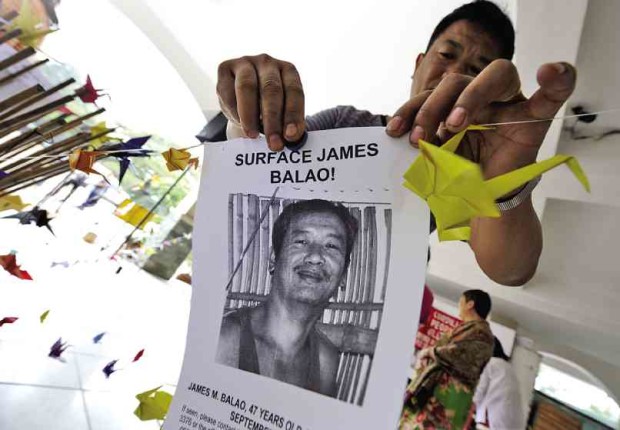
PAPER cranes were among the motifs for a program in 2013 at UP Baguio for missing activist James Balao. EV ESPIRITU/INQUIRER NORTHERN LUZON
The Supreme Court has ordered the Philippine National Police to further investigate the 2008 disappearance of Cordillera activist James Balao, hoping it could shed light on the unresolved abduction earlier attributed to state agents.
In an en banc ruling on Tuesday, the high court rejected the recommendation of the Regional Trial Court (RTC) of La Trinidad, Benguet province, to archive the case, saying the police should be given the chance to pursue the lead that Balao might have been abducted by members of his own organization, the Cordillera Peoples Alliance (CPA).
Taking action on the final case report that the Benguet RTC filed in January, the court resolved to “relieve the Armed Forces and the Commission on Human Rights from their respective obligations to investigate” Balao’s abduction.
Balao, a founding member of CPA, an indigenous peoples’ advocacy group identified with the Left, was seized by five unidentified armed men on Sept. 17, 2008, in La Trinidad.
The court, in a resolution released Wednesday afternoon, directed the PNP “to further investigate the angle presented by (witness) Bryan Gonzales and to ascertain the identifies of ‘Uncle John’ and ‘Rene’ who are persons-of-interest in this case.”
It required the PNP to wrap up its investigation in six months, and submit the results to the local court. The Benguet RTC shall then “submit its full report and recommendations to the (Supreme) Court for final action,” the high tribunal said.
The high court had earlier reversed the RTC’s issuance of a writ of amparo in favor of Balao, ruling on Dec. 13, 2011, that “the totality of the evidence did not warrant the grant of the reliefs,” and that “government involvement in Balao’s disappearance could not simply be inferred from Balao’s activities.”
This, in effect, overturned the Benguet court’s finding that “Balao’s disappearance was due to his political leanings or activities and that the investigation conducted by the public officials concerned was superficial, limited and one-sided and violated his right to security of his person.”
The high court, however, concurred with the lower court that “the investigation conducted by the concerned public officials was limited, superficial and biased.”
In its latest ruling, the court decided to junk the lower court’s position to shelve the case, saying “there appears to still be a valid lead on the part of the PNP.”
Police investigators had found through Gonzales’ testimony that Balao “could have been possibly abducted by CPA members,” or those from his own organization.
The two men the witness had identified in his testimony were likely his “housemates,” according to the PNP, as cited in the resolution. The court said PNP investigation had been stalled by the CPA’s alleged refusal to participate in the probe.